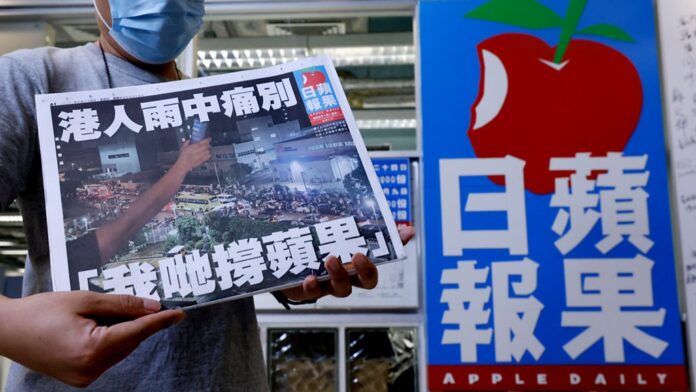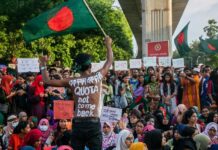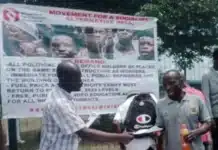The only mass circulation opposition newspaper ceases publication
Socialist Action (ISA in Hong Kong) reporters
In Hong Kong, the government’s white terror against political activity, the media, opposition parties and democratic rights takes new leaps every day.
Apple Daily’s billionaire owner Jimmy Lai Chee-Ying was arrested under the national security law last year. He is one of 114 people so far charged under the draconian law, which was imposed one year ago by Xi Jinping’s regime as a tool to dismantle the territory’s fragile democratic rights and partial political autonomy. Lai’s Apple Daily was the only mass circulation newspaper that supported the democracy protests in Hong Kong.
On June 17, 500 police raided Apple Daily’s offices seizing dozens of computers, servers, and boxes of journalistic material. Security police arrested the editor-in-chief Ryan Law and four other directors of the newspaper for “colluding with foreign forces” which is a crime under the national security law. Two of the newspaper’s editorial writers have also been arrested, one of them at Hong Kong airport on Sunday evening, June 27, as he was about to board a plane to Britain.
Huge attack on press freedom
Police cited 30 “illegal” articles in support of Western sanctions against the Chinese regime (CCP) or pro-CCP Hong Kong officials, as the basis for the arrests. The charges applied retroactively including to articles published in 2019, before the national security law was enacted.
HK$18 million (US $2.3m) in funds belonging to three companies under Apple Daily’s parent group Next Digital were frozen, dealing a crippling blow to the newspaper’s efforts to continue publication. The closure marks a new severe blow to Hong Kong’s democracy struggle following mass arrests of political activists and the banning of demonstrations such as the June 4 Tiananmen massacre commemoratory vigil and the coming July 1 mass protest. July 1 is an annual protest tradition in Hong Kong since 2003, sometimes mobilizing more than 500,000 demonstrators demanding democratic rights.
Many will now feel that if Apply Daily, the second largest circulation newspaper in Hong Kong, can be crushed, nothing will be spared. Whereas previously Hong Kong had a limited semi-democratic political system, Xi’s policies have levelled the playing field bringing repressive totalitarian rule to both China and Hong Kong.
It is clear the government’s rationale for its killer blow against Apple Daily is a wider strike against press freedom and to further terrorise the already shaken ranks of Hong Kong’s news reporters. At a press conference on the day of the police raid, secretary of security John Lee hit out at those who use “journalistic work as a tool to endanger national security”. Asked by reporters to clarify, Chief Executive Carrie Lam, who has abandoned any attempt to not sound like a CCP parrot, said “journalists should be in a position to judge whether one is breaching the law”.
Read more ➵ CCP’s police state in Hong Kong
The clear intent behind such official vagueness is to spread fear and pressure the media to self-censor. It shows that the CCP and Lam have no interest in stopping their intensifying repression. On June 28 it was announced that pro-democracy digital news outlet Stand News will delete opinion articles and no longer accept donations for fear of falling foul of the national security law. This followed reports of anonymous threats to some media outlets.
Another security law!
In further developments, Lam’s government reshuffled at the weekend, bolstering its “national security” profile. Lee, a former police deputy commissioner, becomes Lam’s number two as Chief Secretary. Chris Tang Ping-keung, who became police commissioner in 2019 during the worst phase of police violence, replaces Lee as secretary of security.
The reshuffle reinforces impressions that Hong Kong has graduated into a police state, to the delight of the local pro-CCP capitalists. “I don’t think there’s any problem with a police state,” was the revealing comment of Alice Mak, vice chairperson of the pro-CCP Federation of Trade Unions and a Hong Kong legislator. The FTU is not a trade union, but a racist authoritarian Hong Kong support party for the Chinese regime.
New security chief Tang spoke of imposing another national security law, ‘Article 23’, meaning a more specifically localised law to deepen the crackdown against Hong Kong’s political opposition. ‘Article 23’ legislation has been shelved for eighteen years following the historic 2003 mass demonstration on July 1, which also hastened the demise of shipping tycoon Tung Chee-hwa’s first post-handover government. Feeling that momentum is now with them, the pro-CCP establishment is sharpening its knives for even more attacks.
It is understandable that millions of Hong Kong people mourn the loss of Apple Daily. On its final day, long queues formed in many parts of the city as the newspaper printed a million final copies, instead of the normal 80,000 print run. The closure of Apple Daily leaves the pro-CCP media unchallenged, with its often racist, anti-refugee, anti-LGBTQ, and of course slavish pro-dictatorship line.
Apple Daily was also known for its sexism although this has been toned down in recent years. In the 1990s, it was known as the pioneer of gossip-style paparazzi journalism. This form of sensationalised, exaggerated and celebrity-focused news coverage did not raise, but rather lowered, the political level in society. Also in the past, although it shifted in recent years reflecting changes in public attitudes, Apple Daily echoed the anti-migrant stances of the pro-CCP camp, for example over the ‘right of abode’ controversy – a famous (unsuccessful) court case in 2011. Latterly it adopted a more neutral position, even mildly critical of the government’s racist discriminatory policies towards Hong Kong’s 400,000 migrant women workers who work under slave-like conditions.
Apple Daily also gave an expansive platform to the racist anti-mainlander arguments of Hong Kong’s right-wing localists. This antipathy to ordinary people on the other side of border, failing to distinguish between the rulers and those they rule over, became a critical self-limiting factor in the 2019 mass struggle. As socialists explained, the only possibility to escalate and win the struggle against dictatorship is to spread it to China.
Infamously in 2012, Apple Daily published a racist advertisement, funded by localists, attacking mainland Chinese as “locusts”. Socialist Action together with students organised anti-racist protests and replied to the localist propaganda with facts: Apple Daily advert – We’ve had enough of racism!
Ultimately, it is the CCP’s repressive pro-capitalist policies, justified with bombastic right-wing Chinese nationalist rhetoric, combined with the extreme weakness of the workers’ movement and the left, which has created a breeding ground for anti-mainlander racism in Hong Kong.
Apple Daily’s record
This goes to show that even the most “liberal” corporate media is in the final analysis a weapon of the capitalist class to spread and implant anti-working-class ideas, to divert and prevent challenges to the capitalist system.
Socialist Action criticised Apple Daily’s billionaire-funded political positions, but we also defend it against the dictatorship’s media bans, censorship and insistence on a total monopoly of information. While we protest against this savage attack on press freedom, we reserve the right to oppose Apple Daily’s editorial line, which was never consistent in its support of mass action to challenge authoritarian rule.
Throughout its 26-year history in Hong Kong, Apple Daily consistently backed the more conservative anti-struggle wing of the democracy movement. Lai donated millions to a number of pan-democratic parties giving him influence over their policies. In 2010, Lai and Apple Daily’s editors opposed as “too radical” the May 16 (‘516’) de facto referendum movement: five byelections triggered by the resignation of pan-democratic legislators to mobilise support behind demands for a one-person-one-vote electoral system. One of the five was ‘Long Hair’ Leung Kwok-hung, who now languishes in jail facing a ‘subversion’ charge under the national security law.
In 2014, Apple Daily gave a platform to the compromise wing of the pan-democrats to call for an end to the Umbrella Movement street occupations. Far from being the instigator of democracy protests, as CCP propaganda misleadingly claims, Apple Daily generally only supported calls for mass action when protests had already begun to mobilize large numbers. Its real distinction was to refuse to act as a government mouthpiece in common with the rest of Hong Kong’s mass media.
While defending the right to free speech and freedom to publish, the working class cannot rely on any section of the capitalist class, including the microscopic layer of “democratic” Hong Kong capitalists such as Lai, to be allies in the struggle against autocratic rule. Workers need instead to build our own forces, independent organisations, a working class political party, and our own working-class anti-capitalist media.
Role of liberal bourgeoisie
The struggle for democratic rights such as democratic elections, freedom of the press, the right to strike, freedom of assembly, etc., is not and never can be led by the capitalist class. This class is too invested in the autocratic regime which defends its profits. The majority of capitalists in Hong Kong, including foreign corporations from “democratic” countries, have historically supported and cultivated close links with the CCP dictatorship since it embraced capitalism in the 1980s.
This dominant wing of the capitalist class has always opposed the democracy movement and rejects even minimal democratic reforms. True to form, the Hong Kong capitalists overwhelmingly support the CCP’s vicious crackdown and its national security law. They praise this for bringing “stability”, something that has yet to be witnessed.
This disposition of political forces – which classes support and which oppose the current repression – is something that confuses some on the left, mainly Stalinist-influenced layers. They mistake the CCP’s authoritarian nationalism and anti-US ‘wolf warrior’ rhetoric for anti-capitalism. This is patently not the case as shown by billion-dollar bank HSBC, which actively supports the national security law.
Lai represents a capitalist minority that “support” the democracy struggle only to prevent it going too far in challenging the existing order. This is also the role the liberal factions of the capitalist class play in Iran, Myanmar, Thailand and elsewhere. Lai and his wing of the pan-democratic opposition stand for an elite-only approach, with control over the democracy struggle in the hands of a small clique of “pragmatic” and “compromise-minded” leaders. Time after time these parties and leaders – the ‘moderates’ – have demobilised struggles and tried to restrain the masses.
They fear that if the masses themselves are in the driving seat the movement will become radicalised and could develop into a full-blown struggle against capitalism, its bloodsucking grip on the world’s most unaffordable housing market, the lack of union rights and horrific social inequality.
Magnitsky sanctions
This elitist top-down approach is also reflected in the issue of Western sanctions, which downgrade the role of mass struggle and reinforce the idea that only the rich and powerful, in this case the pressure of foreign governments, can bring about a solution to the problem. Socialist Action in Hong Kong warned during the 2019 mass struggle that sanctions represented a political trap rather than a way forward for the struggle. This is despite the fact the sanctions are popular among many Hong Kong people and among other groups, such as Uighur exile organisations and mainland Chinese dissidents.
Read more ➵ Is the US behind Hong Kong’s protest movement?
From the start, the “Magnitsky-style” sanctions imposed by some western governments were designed to be a limited, largely symbolic measure, targeting a few individuals rather than wider economic interests. This allows Western corporations and capitalists to continue profiting from relations with authoritarian regimes while their governments put on a show of defending “principles”.
The growth in support for sanctions in Hong Kong came about in the late stages of the 2019 mass struggle in which millions had been mobilised. After months of intense struggle the movement was checked, pushed back by vicious police repression. This impasse was due to the crucial absence of mass organisations and a clearer political alternative to the CCP dictatorship. Out of mass frustration and even desperation – a feeling of having “tried everything” – illusions in Western sanctions grew.
The US imposed largely theatrical sanctions on a small number of CCP and Hong Kong officials. Even Beijing’s nationalistic Global Times called them “mosquito bites”. Xi Jinping’s regime of course vents its rage against the sanctions no matter how small, otherwise China’s “strongman” will appear weak and submissive on the global stage. The severe repression against individuals like Jimmy Lai in Hong Kong flows from the dictatorship’s need to demonstrate strength in the US-China Cold War. These are not the actions of a confident and stable regime.
The West’s sanctions and China’s counter-sanctions do not assist the anti-authoritarian struggle. Rather they undermine it, incite nationalism on all sides, and spread more confusion about what kind of struggle is needed to defeat police terror and dictatorship. From the standpoint of the workers’ movement the key criteria for any measures used in the course of struggle is that they must be under the control of the masses themselves, not controlled by unaccountable capitalist elites.
What’s needed is mass revolutionary struggle for full and immediate democratic rights, independent workers’ organisations and trade unions, and a break with capitalism. The struggle against dictatorship can only go forward under the democratic leadership of Hong Kong and mainland workers and youth, through the creation of their own mass struggle organisations, completely independent of capitalist media, governments and politicians.




